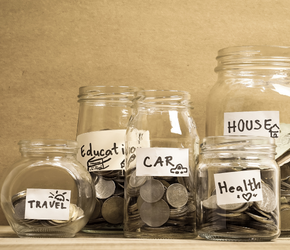Keep Worries Down While Prices Go Up
August 31, 2022 Tips & Tricks Housing Counseling

If you’ve got inflation on the brain, you’re not alone. It’s easy to let your stress levels rise along with the cost of living, especially if your budget was already stretched to begin with. When inflation hits, it means you’re paying more for the same goods and services, bringing down your purchasing power. But it doesn’t have to overwhelm you!
Our Housing & Financial Counseling team has some pointers to help you be more strategic about your spending and stay in control of your finances:
1. Reassess and Revisit
This is the time to think about your priorities and your goals – and reassess them if necessary – then adjust your budget to bring your spending into alignment with those aims. Start with your non-essential expenses. That’s your memberships, your subscriptions, your “extras.” Do you have a gym membership collecting dust? A streaming service you don’t need? This is the time to think about what serves your priorities and moves you toward your goals, and tighten up on the expenses that aren’t necessary.
There’s nothing you can do about your essential expenses, right? Not true! It might take some research and planning, but there are ways you can reduce even those necessary expenses so they take less of a toll on your budget. For instance, you might lower your grocery bill by designing weekly meal plans around coupons and deals you find. Or, take a look at the services you pay for and do some comparison shopping. Can you shop around and find a better rate for your car insurance? What about your service contracts for things like cable, internet, and mobile plans? Try calling your providers to ask if they can offer a better rate or cheaper plan.
2. Save for Success
When facing inflation, it’s more important than ever to be sure to contribute a portion of your income every month toward your savings. Having a savings cushion is critical – it can be the safety net you need in unforeseen circumstances. It can mean that a job loss, a medical bill, or a rent hike doesn’t spell disaster. It will also keep you from having to resort to borrowing and getting saddled with high interest rates.
Ideally, 10% of your monthly take-home pay should go into your savings. If you cannot set aside 10%, allocate an amount you’re comfortable with – no amount is too small. The habit and the consistency are key. And just think – saving $4 a day adds up to $121 you’ve saved each month, which amounts to nearly $1,500 over the course of a year!
3. Decrease that Debt
With interest rates rising, you will definitely feel the pinch in your plastic – your credit card debt, that is. When you carry balances from month to month, the interest often accrues daily. So, if all you do is the minimum payment, the amount you owe can grow by a lot, and quickly. That’s why it is vital to focus on paying down credit card debt.
If you cannot pay the balance in full, do your best to pay more than the minimum required amount. Even if it’s just a small amount over that minimum – $20, $30, $40 – it’s still worth the investment. That small amount makes a huge difference in how much interest you’ll end up on the hook for, and how long it will take you to pay off the balance.
Looking for a little more personalized guidance?
We’re here for you. Habitat East Bay/Silicon Valley’s Housing and Financial Counseling Program offers free one-on-one support to help you gain control over your personal finances. Our counselors can teach you strategies for balancing income and expenses, create a debt repayment plan, build savings, repair and improve your credit history, or financially prepare to reach the goal of homeownership.
You can also visit our FREE online Financial Education Center. This is a FREE resource that is available to you 24 hours/day, 7 days a week from your computer, mobile, or tablet. You will gain access to a series of self-paced lessons that you can complete in just 3-10 minutes and learn about personal finance topics, including how to manage personal finances even during difficult times.
Check out this free playlist of lessons and resources from the Financial Education Center created to help you build financial resilience!


Join the Conversation
Leave Us a Comment!
We love hearing from our community. Let us know what you think by leaving us a comment below.